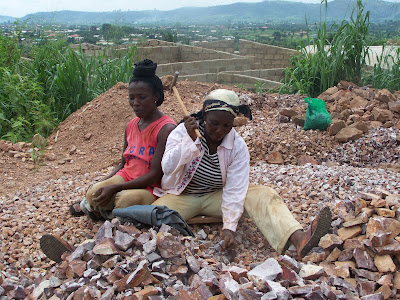The first was Katapor. I focused on the school, visiting the classrooms and interviewing teachers and students, as well as the headmaster. There were 212 students (88 in the nursery). They have two breaks during the day and all break at the same time. Not all kids can go because some cannot afford the uniform and books cost. By Ghanaian law, they cannot work in the market either, so some kids are just running around. There are books and the kids get homework, but many do not have any light at home. Some may have one kerosene lamp for a family of nine. The school itself was fairly light because there were a lot of windows, but I wonder what would happen in a storm (during these three months it sometimes rains nearly every day). There is no glass so the blinds would have to be closed. There are also no science labs at that school, so it would be extremely beneficial to have one using the merry-go-round and zip-line.
The second school was Nii Otto Kwame. It was much darker. It was made of thick cinder block and did not have any windows, just some decorative designs with holes. They did have a science lab, or at least a box with some test tubes and cylinders they measure water in. They have a mini-microscope as well. I focused more on interviewing village members this time. Many (maybe half) have no light. The rest have maybe one lantern for the whole family. There were, however, some civil unity problems in this village. There is some argument over who should be the chief. Traditionally, it was decided that the first family to settle the area are the royals and that is where the chief comes from. We met with the chief and he told us they had been on national news for some fighting. This school was very crowded with over 400 students. It was not big enough so they had to rotate classrooms with one class meeting under a tree. Mind you, these are all government schools, as we are working with the Ministry of Education.
I am not sure this school is a good candidate. There are too many students to regulate lantern distribution, and the kids did not seem as organized or obedient as Katapor. The civil unrest also makes me wonder what would happen if we suddenly dropped a playground in their area.
Many women in the area are stone crackers. I asked if they could show me so the four women took me up a hill and showed me the quarry and how they gather big rocks and carry them out on their head and hit it with this primitive looking hammer to break it down. I asked if I could do it, so I sat on that hill and cracked stones with the women. One woman tried to also put the bowl of large rocks on my head but the others began to scream, so I pretended to hold a bowl on my head and walk swerving back and forth and they all laughed and laughed. I made some great friends in that village. The men were complaining that there was no work for them in the village. I asked why they couldn't help in the quarry or carrying the rocks. They all laughed at me and said, "that's a woman's job!"



The funny thing about visiting these villages it that nobody except the headmasters were supposed to know we were coming or why we were there. However, hundreds of village members sat in the middle of the schoolyard for three hours waiting for us at both schools. The chiefs were sitting front and center in their traditional garb. They had a table with a white tablecloth and flowers for us to sit in front of them. They expected a speech.

Luckily, Jeff (MPA study abroad professor) and Catherine (professor and MPA administrator) were able to make one for us. Even when the ministry told the people to go away, they still waited! The kids at the second school had planned a song, a few educational speeches, and a skit in which each child dressed in a traditional tribal uniform and told us about the culture. Then they brought out a Ghanaian flag to tell us which each color represented. The kids kept calling us their "honored guest from the United States." We were also able to play some games with the kids.

The village members, apart from 'not knowing we were coming', were not supposed to know why we were there. Once Jeff asked what the greatest need in the community was and a man said, "we need a merry-go-round!"
No comments:
Post a Comment